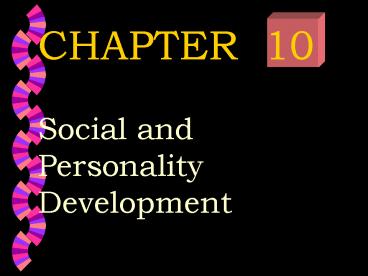Social and Personality Development PowerPoint PPT Presentation
1 / 23
Title: Social and Personality Development
1
CHAPTER 10 Social and Personality Development
2
Perspectives on Social and Personality Development
- Social development
- ways in which a persons interactions and
relationships with others change as that person
grows older - Personality development
- emergence of distinctive styles of thought,
feeling, and behavior
3
Perspectives on Social and Personality Development
- Psychoanalytic theory (Freud)
- Psychosocial theory (Erikson)
- Social learning theory
- Cognitive developmental perspective
- Biological perspective
4
Social and Personality Development in Infancy
- Beginnings of social relationships
- social smile
- temperament
- bi-directional influence
- reaction range
5
Social and Personality Development in Infancy
- The formation of attachments
- Harlows monkeys
- secure attachment
- infant expects that caregiver will be available
- anxious attachment
- caregiver cannot be counted on for comfort
6
(No Transcript)
7
Social and Personality Development in Childhood
- Self-understanding
- physical self
- active self
- social self
- psychological self
8
(No Transcript)
9
Individual Differences in Development
- Environmental influences
- parenting styles
- authoritative vs. permissive
- child abuse
- physical, sexual, or neglect
- the impact of divorce
10
Individual Differences in Development
- Genetic influences
- sociability, emotionalism, and general activity
level - The interplay of genes and environment
11
Group Differences in Development
- Gender roles
- patterns of behavior characteristic of members of
ones own sex - Biological influences
- some behavioral differences between the sexes
appear before much contact with the social
environment
12
Group Differences in Development
- Environmental theories
- The Freudian perspective
- Oedipus conflict
- The social learning perspective
- The cognitive developmental view
13
(No Transcript)
14
Socialization and Moral Development
- Socialization
- learning the expectations and values of ones
society - Internalization
- incorporating societys values into the self to
such an extent that violation of those standards
produces guilt
15
Socialization and Moral Development
- The Freudian perspective
- child internalizes the moral code of the same-sex
parent - rapid development of superego
- The social learning perspective
- children act morally due to reinforcement
- children have moral models to imitate
16
Socialization and Moral Development
- The cognitive developmental perspective
17
- In Europe, a woman was near death from a very bad
disease, a special kind of cancer. There was one
drug that the doctors thought might save her. It
was a form of radium that a druggist in the same
town had recently discovered. The drug was
expensive to make, but the druggist was charging
ten times what the drug cost him to make. He paid
200 for the radium and charged 2,000 for a
small dose of the drug. The sick womans husband,
Heinz, went to everyone he knew to borrow the
money, but he could get together only about
1,000, which was half of what it cost. He told
the druggist that his wife was dying and asked
him to sell it cheaper or let him pay later. But
the druggist said, No, I discovered the drug,
and Im going to make money from it. Heinz got
desperate and broke into the mans store to steal
the drug for his wife. - Stage 1. Punishment/obedience.Stage 2.
Instrumental hedonism.Stage 3. Mutual
interpersonal expectations.Stage 4. Social
systemStage 5. Social contract.
18
Social and Personality Development in Adolescence
- Secondary sexual characteristics
- Importance of timing of puberty
- Establishment of an independent identity
- Peer relationships
- Psychological and sexual intimacy
19
Social and Personality Development in Adulthood
- Early adulthood
- period of action
- challenge to women
- change in attitudes and concerns
- age-thirty crisis
20
Social and Personality Development in Adulthood
- Mid-life and beyond
- changes resulting in crises
- consistent with Eriksons seventh stage
- generativity
- the desire to reach out and become concerned with
the well-being of future generations
21
Social and Personality Development in Adulthood
- Individual differences in adult development
- Coping and satisfaction in adulthood
22
Stability of the adults personality
- Mean levels of personality traits change with
development, reaching adult levels by age thirty.
Between twenty and thirty, people tend to become
less emotional and more responsible and
cooperative - Beyond age thirty, the only significant
personality changes are those related to reduced
physical activity
23
Stability of the adults personality
- By age thirty, personality traits are essentially
fixed - All of the major personality traits display this
stability - Stability of personality holds true regardless of
gender, race, or other demographic categories

